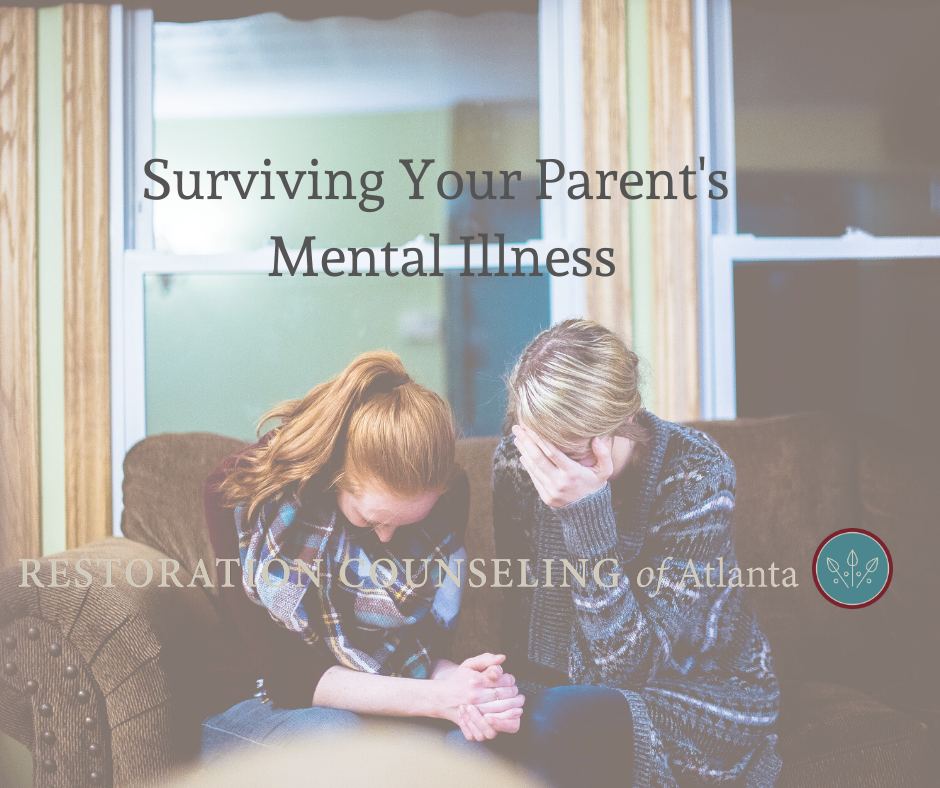There are many populations of people for whom the holidays are difficult. Children of mentally ill parents are one of these people groups. For these, surviving their parent’s mental illness can be a real struggle. They routinely confess their relief that we are past the holidays and the accompanying time spent with family. Their parents could have or have had one of these common disorders: bipolar disorder, an anxiety disorder, ADHD, schizophrenia, alcoholism or other drug abuse, or depression.
Understanding the Scope of the Problem
You may be surprised just how many grew up in homes with parents who have a mental illness. Kate Jackson in Social Work Today, relying on the National Institute for Mental Health, puts forth some numbers. She states that “9.8 million Americans aged 18 or older, or 4.2% of the adult population, are living with a serious mental illness such as schizophrenia, bipolar disorder, or major depressive disorder.” Further, Jackson notes that “two-thirds of females and one-half of men who are afflicted with serious mental illnesses are likely to be parents.” For emphasis, Jackson quotes Dr. Joanne Nicholson, a professor of psychiatry at Dartmouth Psychiatric Research Center in The Geisel School of Medicine at Dartmouth University. She raises the alarm that “there’s a significant number of individuals with some level of emotional distress who are raising children.” [1]
Knowing about this large group is important. It is more urgent to know if you are in this group. Is someone you care for in this group? If so, now that the stress of the holidays is over, this is a good time to do something. As you reflect on, understand and prepare for the dynamics at work in your family, you will prepare for the future. This preventative work now will pay dividends in the future.
Common Negative Effects
Sadly, when your story includes the presence of mentally ill parents, you often feel isolated from others. You think they don’t know or couldn’t imagine what your home was like. Children with these dynamics in their homes can work hard to hide their parent’s distortions, neglect, and conflict. They don’t want to stand out among others. The difficulty is compounded because often the illness visits the children as well. However, this does not need to be the last word. I offer some positive steps you can take at the end of this article. First, I’ll review some of the common negative effects of having a parent with mental illness. This will help you begin to evaluate if this is part of your story and to what extent.
Distortions
The children of mentally ill parents often submit themselves to the distortions of the parents. This happens even when the children recognize the distortions for what they are. Parents may have anxieties that are crippling and dysfunctional which they also pass on to their children. Constant mantras of fear and distrust are one example of how this is done. Parents that have obsessive habits and beliefs to which they subject their children is another. These examples may or may not match your story. Even so, it is a good practice to examine the source of the rules by which you live. It is also wise to think through the mental and emotional state your parent was in when he or she passed these rules on to you.
Families are interactive and adapting systems. They develop spoken and unspoken rules as a result of the trouble within their families. These rules may include concealing or covering for their parent’s mental struggles. Another might be a shared denial that insists that the family may not recognize or speak about the problem. Or the family must pretend that the problem isn’t that bad. Maybe no one is allowed to challenge or confront the parent and his or her problem because of the parent’s fragility or inability to deal with stress.
Remember how powerful families are in shaping us and our reality. If yours was troublesome, then it is good to learn how it functioned poorly and what you can do about it today. Some children will struggle to love parents that hurt them so deeply, even when it was out of the parent’s control. Others love their parents deeply still. Both may worry about dredging up the past. Probing these distortions and their origins does not mean you are dishonoring your parents nor excusing them. You are simply getting to the root of the problem so that you may grow healthier.
Neglect
Because some parents weren’t safe or mentally stable, they may have been in and out of treatment facilities. They struggled with suicidal thoughts, crippling depression, or an addiction. Their children found it difficult to know the parent’s mental state one moment to the next. This unpredictability teaches children that they should not bring their issues to the distressed parent. They might even go a step further and avoid bringing things to the more healthy parent. This might be because that parent is too busy surviving the spousal absence and financial burdens of mental illness to attend to the child. Often the child has to step into a part or all of the parental roles and responsibilities for herself and for siblings.
Neglect is difficult and traumatic to experience or even to witness. Beyond direct neglect, it can make children vulnerable to other hurts, stalled development, and isolation. Parents fail to intervene when a child is exploring unhealthy thoughts and practices. Parents do not observe missed developmental milestones and thus do not address remedial options. Further, as the children mature and grow, they are left to themselves to make sense of their neglect and inherited distortions. For these reasons, it is important for you to seek new perspectives. These would be broader than your personal family and would challenge past teachings modeled in your home.
Conflict
Marital conflict is common for couples where one person suffers from mental health issues. For instance, finances are a common source of conflict in marriages in general. In marriages marked by mental illness, it is even more common. The parent’s mental illness often leads to interrupted employment for one or both parents. There would be additional treatment costs of the illness itself. The burdens of caring for another person will strain a relationship. It may cause a healthy spouse to become emotionally distant for protection. That person may even leave the relationship. When one spouse wants to leave, they often feel guilty and stay, but teem with bitterness and anger. Therefore, many of these couples fight regularly because of the mental illness, and this takes its toll on children.
Children may come to the conclusion that marriage is undesirable or even dangerous. However, it is important to remember that the institution of marriage did not cause these problems. Rather, a marriage was taxed by a mental illness more than it could bear or was asked to bend more than was possible. It’s important to see these negative elements as a result of mental illness.
Inherited Illness
Lastly, it is important to note that genetics and the environment can cause some of these very challenging mental illnesses to visit the children of mentally ill parents. To have more than one ill person in a family aggravates an already difficult situation, and unfortunately, it regularly occurs in families.
Evaluate the Effects
The following list of symptoms can help you determine if your parent’s illness has had a negative influence on your life and health.
- You have difficult and confusing parental relationships.
- You have feelings of abandonment.
- You feel the need to take on the parenting role. This is known as parentification.
- You have feelings of isolation.
- You sense a lack of understanding and support from nonrelatives.
- You have difficulty trusting others.
- You have an inability to maintain relationships.
- You have grief.
- You have low self-esteem.
Do you have one or more symptoms in this list and do you know that one of your parents had a mental illness? If so, then I encourage you to seek validation, helpful tools, and relief by working on your family background with a therapist. We can’t change your past What we can do is help you overcome it and limit or eliminate the harmful growth of these negative effects. Below is another list of helpful factors that you can cultivate to begin healing or to help someone else heal.
Positive Actions
Researchers with the American Academy of Child and Adolescent Psychiatry have identified the following factors that protect children and reduce the negative fallout from parental mental illness.
- The child embraces the knowledge that the parent(s) is ill and that the child is not to blame.
- The child receives help and support from family members.
- The child experiences a stable home environment.
- The child and parent(s) receive psychotherapy.
- The child is given a sense of being loved by the ill parent.
- The child is encouraged to develop a naturally stable personality.
- The child is encouraged to build positive self-esteem.
- The child learns inner strength and good coping skills.
- The child develops a strong relationship with a healthy adult.
- The child builds friendships and positive peer relationships.
- The child cultivates an interest in and success at school.
- The child develops healthy interests outside the home.
- The child receives help from outside the family to improve the family environment (for example, marital psychotherapy or parenting classes). [2]
How can you develop some of these factors, or help someone you care about to do so?
Conclusion
Individuals, when they come for counseling, frequently tell us stories about the impact of parental mental illness on them. Many are ashamed that this is their family story. They think they suffer alone with this broken background. However, as we saw above, many share these challenges. We can testify that beginning to talk with someone about the hurtful relationships they’ve had with their mentally ill parents helps. We rarely get better from relational struggles in isolation. Counseling is a great place to learn how to deal with struggles just like this. Don’t fall prey to the lie of thinking that you’re the only one with things like this in your family. You absolutely aren’t.
Sources:
- Kate Jackson, “Children of People With Serious Mental Illness,” Social Work Today, June 2016, https://www.socialworktoday.com/archive/052416p24.shtml
- “Mental Illness in Families,” Facts for Families, American Academy of Children and Adolescent Psychiatry, accessed on January 2, 2020, https://www.aacap.org/aacap/families_and_youth/facts_for_families/fff-guide/children-of-parents-with-mental-illness-039.aspx

Written by: Jennifer Stuckert, Clinical Director, LPC
Roswell Location
jennifer@restorationcounselingatl.com, ext. 111
Jennifer is passionate about using distinctly Christian counseling to help struggling individuals, couples, and families. Since 2009, she has served as the director and supervisor of the staff of Restoration Counseling of Atlanta. She has two decades of counseling experience and helping people gain relief from life challenges. Jennifer uses biblically sound methods with a specific emphasis on adaption according to personality and learning styles. She is certified in EMDR and completed extensive course work in Sexual Addiction Counseling.

